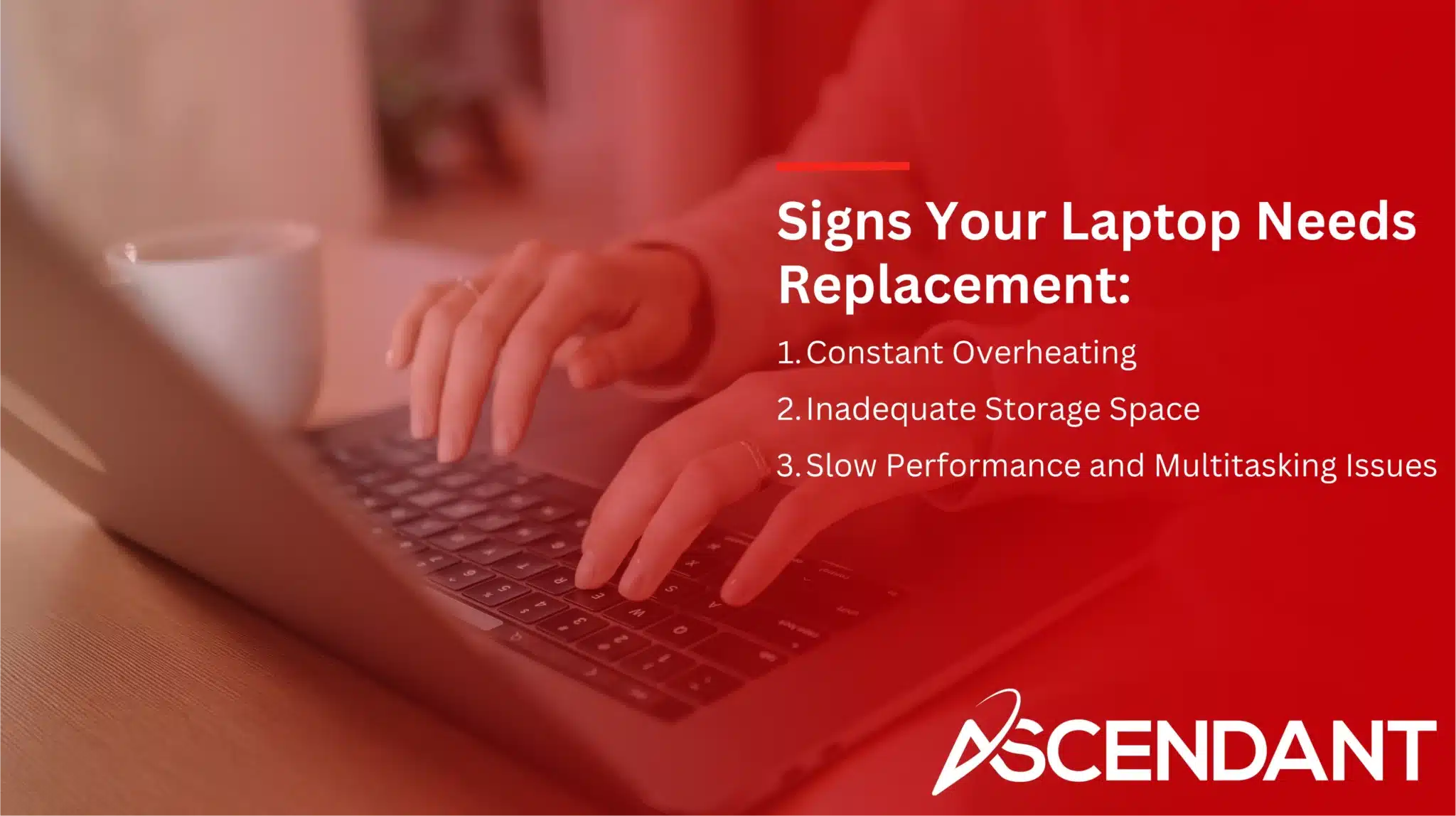Wondering how long do laptops last? Most laptops typically last 3 to 5 years, depending on use and care. This article explores factors impacting laptop lifespan, how to prolong it, and when to replace your device.
Key Takeaways
- The average lifespan of laptops varies: consumer models last 3 years, business models 5-7 years, and high-end models like Apple laptops can last up to 10 years with proper care.
- Quality hardware components and upgradeable parts are essential for extending a laptop’s lifespan, as they enhance performance and allow for future improvements, reducing the need for replacement.
- Regular maintenance, including software updates, battery care, and cleaning, is crucial to prolonging a laptop’s lifespan and ensuring optimal performance.
Average Lifespan of a Laptop
The lifespan of a typical laptop is considered to range from 3 to 5 years, but this duration can differ due to multiple factors. Laptops intended for consumer use, which are commonly utilized for routine activities such as document creation and web browsing, tend to have a lifespan of around 3 years when maintained properly. Conversely, business laptops that are equipped with more robust components may last between 5 to 7 years. Despite their sturdy build designed for gaming purposes, gaming laptops often have lifespans comparable to an average laptop — about 3 to 5 years — owing primarily to the high strain exerted on their hardware.
Laptops at the higher end of the market spectrum—including those by Apple—typically exhibit extended longevity. An Apple laptop can maintain efficient operation up to approximately seven or even ten years if cared for diligently. Opting for pricier models could potentially enhance the durability and overall life expectancy in contrast with less expensive alternatives.
Being aware of how long various types of laptops usually last assists consumers in making well-informed choices prior to purchasing these devices.
Quality of Hardware Components
The durability and performance of a laptop are significantly influenced by the caliber of its internal hardware. Utilizing superior components can bolster overall device performance and prolong its service life, whereas inferior parts might have ten malfunctions or give rise to compatibility complications. The motherboard stands as an especially pivotal element. Laptops with RAM and solid-state drives (SSDs) that are soldered onto the motherboard typically have less flexibility for upgrades, potentially curtailing the system’s lifespan.
Enhancing certain hardware aspects, such as upgrading memory capacity through additional RAM or transitioning to a solid state drive from traditional storage options, can markedly boost a laptop’s operational efficiency and response times. These improvements not only refine user interaction but also help maintain the relevance and capability of laptops over more extended periods. Laptops designed with modular components—those which enable users to update or replace various elements—are expected to possess greater longevity due to their adaptability over time.
Overall, prioritizing high-quality internal components within laptops—and keeping in mind their upgradability—is essential when contemplating long-term use. Selecting devices that offer opportunities for component replacement is prudent, assuring you can continually enhance your system’s efficacy extending its viability well into the future.
Battery Life Considerations
The longevity of a laptop’s battery plays a crucial role in determining the overall lifespan of the device. To decelerate the inevitable deterioration that batteries undergo, conscientious maintenance and usage are key. The way you charge your battery can make a difference—avoiding exposure to extreme temperatures and adhering to moderate charging habits, such as keeping the charge level between 20% and 80% rather than allowing it to completely drain to 0%, will have positive effects on its life expectancy.
Performing regular calibration on your laptop’s battery is beneficial for maintaining accurate charge indicators and boosting performance. This entails fully charging then completely discharging the battery before recharging it back up again. By doing this, you enable more precise measurements by its internal circuitry regarding remaining power levels, which contributes not only to better efficiency but also potentially lengthens its usable life.
Preserving your laptop’s battery involves curtailing unnecessary background operations and refining energy consumption settings. Both tactics help in conserving electrical draw while reducing thermal output from overworked components which aids in sustaining enhanced functionality of both the machine itself as well as its source of power. Adhering to these strategies is vital for fostering an enduringly healthy state for any portable computer’s power cell thereby stretching out not just moments between individual charges but also expanding upon terms measured across cycles cumulatively spent throughout entire periods marking ownership durations.
Signs Your Laptop Needs Replacement
Understanding when to substitute your laptop is critical for maintaining productivity and security. A noticeable sign that it’s time for a new laptop includes deteriorated performance. Should you find your device laboring under the load of simultaneous applications or experiencing prolonged boot-up and shutdown times, this might signal the need for an upgrade.
Another telltale sign of an obsolete laptop is its inability to support current operating systems. When a system falls behind on compatibility with recent OS versions, it may not have access to crucial security features, potentially exposing users to cyber risks.
Ensuring that both your antivirus software and operating system are up-to-date plays an essential role in defending against digital threats. It’s important to replace any outdated laptops incapable of supporting these vital updates in order to ensure continuous protection and optimal function.
Constant Overheating
Consistent overheating of a laptop should be taken as a clear signal that the device might require replacement soon. Such persistent thermal issues often point to deeper problems with the hardware, which can shorten the life expectancy of your system by causing accelerated wear on components and, in some cases, result in severe breakdowns.
To prevent such overheating occurrences, it is crucial to maintain the cooling mechanisms within your laptop regularly. Accumulation of dust in areas like vents and around fans impedes proper air circulation, contributing to increased temperatures inside your computer. Engaging in regular maintenance practices—including cleaning internal parts for optimal airflow—can substantially diminish overheating risks and extend the operational lifespan of your machine.
Inadequate Storage Space
A laptop’s performance can be significantly hindered by a lack of adequate storage space. When hard drives approach their maximum capacity, the system may experience difficulty in efficiently retrieving files and resources, which can result in longer boot times and slow behavior. Users might frequently encounter warning messages about insufficient disk space, causing applications to crash or not load properly due to inadequate available storage.
Leveraging external hard drives or utilizing cloud-based storage services are effective strategies for mitigating limited internal storage issues. These options enable users to transfer data off of their primary storage systems, thus maintaining a more reasonable volume of information on the device itself.
Taking steps to identify and delete superfluous files plays an essential role in enhancing laptop performance. Hence effective management of the device’s existing storage is key.
Slow Performance and Multitasking Issues
If you’re experiencing sluggishness and challenges with multitasking on your laptop, it could be an indicator that the computer is due for a replacement. A laptop can become slow over time as more applications are installed, particularly if the device doesn’t have adequate RAM to handle them all. When difficulties arise in running several programs at once, this suggests that your laptop might be having trouble keeping up and could benefit from an upgrade.
When you notice extended loading times for software on your device, this might be a sign pointing towards the necessity of acquiring a new computer. To enhance boot speed and overall performance, try limiting startup processes to those which are strictly necessary. If such optimizations fail to resolve these persistent issues adequately, it may indicate that your current laptop no longer aligns with your computing requirements.
Impact of Usage Patterns
The way a laptop is utilized heavily influences how long it will last. Engaging in demanding activities such as gaming and video editing tends to produce excessive heat, which can accelerate the wear and tear of the internal components. For users who often perform these heavy-duty tasks, their device’s lifespan could be notably shortened when compared with those who use laptops for lighter purposes.
On the other hand, devices employed for simpler operations like web browsing or working on documents Endure less stress and have a tendency to survive longer. Being aware of how your specific usage patterns impact the longevity of your laptop is key to adopting habits that mitigate damage over time, thereby extending the useful life of your machine.
Importance of Regular Maintenance
Maintaining a laptop through regular upkeep is essential to extend its working life and improve its efficiency. Adhering to routine maintenance tasks, such as updating software regularly and utilizing antivirus programs, can substantially increase the resilience and operational capacity of your laptop. Neglecting these practices can result in slowed down performance due to outdated drivers or unnecessary applications that use up considerable system resources.
The longevity of thermal paste is shortened by consistently operating at high temperatures, which also puts additional strain on cooling systems. It’s imperative to perform periodic inspections and care for these components. The amount of time you spend using your laptop will inevitably affect how quickly it experiences wear and tear—more frequent usage accelerates this process. To ensure that your laptop remains in optimal condition, implementing consistent maintenance procedures is crucial.
Cleaning and Dust Management
Maintaining a dust-free laptop is crucial for preventing strain on the hardware and guaranteeing that airflow is unobstructed. Accumulations of dust in the device’s vents and fans can lead to overheating, which may result in hardware malfunctions. Employing cleaning kits designed for laptops and conducting routine maintenance of the cooling system aids in preserving the condition of your device.
If you notice that your laptop’s fan seems to be working continuously, it could signify that accumulated dust is putting stress on its hardware. Ensuring cleanliness not only enhances hygiene by diminishing germ accumulation on common surfaces, but also deters overheating issues, thereby prolonging the lifespan of your laptop.
Software Updates
It’s essential to maintain the operating system and software on your laptop with regular updates. These updates provide vital security patches and optimize performance, which helps protect against potential threats while also ensuring that the system runs seamlessly. By keeping your software current, you enhance the durability of your laptop by avoiding issues related to outdated programs.
Maintaining updated software is key to prolonging the effective life and dependability of your laptop. Up-to-date applications and an up-to-date operating system help ward off typical problems associated with obsolete versions, thereby preserving optimal functionality and boosting overall system efficiency.
Antivirus Software
Antivirus software plays a critical role in defending laptops from cyber threats and extending their useful life. By identifying and eradicating malware, such software preserves the security and performance of your laptop. McAfee is a commendable choice for antivirus protection on laptops, offering strong defenses against numerous types of online dangers.
Employing trustworthy antivirus software paired with steering clear of dubious websites constitutes an essential strategy to shield your laptop from malicious attacks. Adhering to this approach is vital for sustaining the well-being of your device, guaranteeing its effective functioning over an extended period.
Storage Solutions for Longevity
By transferring data to external hard drives, one can alleviate the burden on a laptop’s internal storage, potentially extending its overall service life. Cloud storage offers a reliable and expandable option for handling data, contributing to a lesser deterioration of the laptop’s hardware.
Employing a combination of external hard drives and cloud storage not only secures your information, but also minimizes pressure on laptops. Cloud services enable file accessibility across multiple devices – an advantage if ever the laptop ceases to function.
Adopting these strategies for storing data effectively amplifies the durability of laptops by lightening the load on their integral components.
Cost vs. Benefit of Upgrading
Opting to upgrade specific components may serve as an economical substitute for acquiring a new laptop when aiming for significant performance boosts with modest investments. For instance, augmenting the RAM or adopting an SSD can lead to improved system efficiency without necessitating the purchase of a brand-new computer. This method not only saves money, but also spares you from having to set up and migrate data onto a fresh device.
Nevertheless, if upgrading expenses exceed half the price tag of a contemporary laptop, it might be more judicious to invest in a new unit. The trend among manufacturers towards integrating soldered parts helps curb production costs, yet this practice can accelerate obsolescence, prompting devices’ earlier replacement. Conversely, laptops built with replaceable components are built with replaceable components. Enjoy extended service lives since users have the liberty to swap out or enhance pieces when necessary.
Prioritizing upgrades over purchasing new contributes positively toward environmental conservation by diminishing electronic waste accumulation. In weighing whether to refurbish your existing device or obtain another one altogether, deliberate on both approaches’ respective expenditures potential gains in performance and their enduring advantages.
Environmental Factors
The lifespan of a laptop can be greatly influenced by factors such as ambient temperature and moisture content in the air. Exposure to extreme heat may cause the internal components of a laptop to swell, potentially leading to their failure over time. On the other hand, cold conditions are known to negatively affect battery functionality and increase the likelihood of condensation forming within the device.
When laptops are exposed to high levels of humidity, there is an increased risk for corrosion on metallic parts which might result in rust or mold formation inside your device. To enhance longevity, it’s advised that laptops operate under steady room-temperature settings. Using dehumidifiers could also prove advantageous in maintaining optimal operating conditions for laptops situated in humid locales by guarding against moisture-related damage.
Taking steps to counteract these environmental stressors plays an essential role in safeguarding your laptop’s overall well-being and performance.
Tips for Extending Laptop Lifespan
To enhance the longevity of a laptop, one must adopt meticulous care and consistent upkeep routines. Regularly purging dust from the keyboard, screen, and air vents not only upholds their condition, but also mitigates overheating risks. Ensuring that all software remains current is vital for maintaining peak device performance as well as fortifying its security—a key aspect in prolonging its useable life.
Averting potential hazards such as spillages by keeping edibles and liquids at bay can sidestep unintentional harm to your device. Employing a laptop stand can facilitate better ventilation which aids in cooling down the system thus reducing thermal strain on components. Adhering to correct storage methods—shielding it from direct solar exposure and avoiding placing heavy objects atop—are instrumental in preventing structural impairment.
Adherence to these pragmatic measures will significantly boost your laptop’s operational tenure while guaranteeing that it functions seamlessly for an extended period.
Summary
To recapitulate, grasping the various elements that affect the durability of your laptop enables you to take proactive steps and cultivate habits aimed at prolonging its effective service life. The integrity of internal hardware components, considerations surrounding battery longevity, along with how usage patterns influence these aspects—and consistent upkeep—are all integral in shaping a laptop’s lifespan.
By adhering to recommendations presented here, you can safeguard the condition of your laptop so it delivers peak performance and robust security. Bear in mind that diligent maintenance not only boosts work efficiency but also offers financial advantages by diminishing the necessity for early equipment replacement. Incorporate these best practices into your routine and reap the rewards of an enduringly productive laptop experience.
Frequently Asked Questions
How long does the average laptop last?
The average laptop lasts between 3 to 5 years, influenced by factors such as usage and maintenance.
Proper care can extend its lifespan.
What are the common signs that my laptop needs replacement?
Should you notice your laptop’s performance deteriorating, grappling with new operating systems, frequently overheating, running short on storage space, or having trouble handling multiple tasks simultaneously, it might signal that a replacement is necessary.
Such symptoms suggest that the device is struggling to cope efficiently with contemporary requirements.
How can I extend the lifespan of my laptop’s battery?
By adopting appropriate charging practices, performing regular battery calibration, reducing background applications, and ensuring your device is not subjected to extreme temperatures, you can substantially prolong the lifespan of your laptop’s battery.
Adhering to these measures will notably improve the longevity of your device’s battery.
Is it better to upgrade my laptop or buy a new one?
Upgrading your laptop is advisable if it is cost-effective and provides significant performance improvements; however, if upgrades exceed half the cost of a new device, purchasing a new laptop is the better option.
How do environmental factors affect my laptop?
Excessive humidity and extreme temperature fluctuations are crucial factors that can adversely affect the longevity and performance of your laptop.
It is vital to ensure a consistent, room-temperature setting for your device’s protection and to use dehumidifiers when dealing with high moisture levels.



